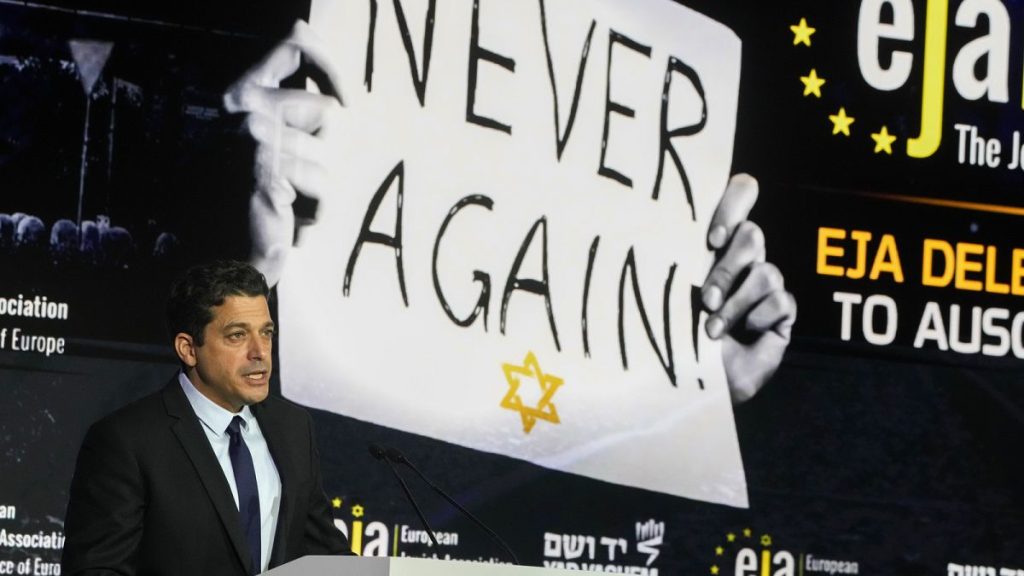The planned participation of Israeli Diaspora Affairs Minister Amichai Chikli in a European Parliament Holocaust remembrance event has sparked significant controversy and opposition from relatives of Israeli hostages held by Hamas and Jewish community leaders. Forty-one relatives of the hostages, along with thirty-two Jewish community leaders, have penned a letter to the event organizers, MEPs Lukas Mandl and Andrey Kovatchev, expressing their strong disapproval of Chikli’s selection as keynote speaker. The letter, addressed to the MEPs and copied to European Parliament President Roberta Metsola and EPP Chairman Manfred Weber, argues that Chikli’s extremist views and divisive rhetoric render him an unsuitable representative for such a sensitive and significant event. The signatories emphasize that Chikli’s presence would not only overshadow the event’s core message but also undermine the European Parliament’s credibility in combating antisemitism and hatred.
The relatives and community leaders cite several specific instances of Chikli’s controversial actions and pronouncements as the basis for their objections. Foremost among these is his reported opposition to the hostage-ceasefire deal that secured the phased release of Israeli hostages captured by Hamas in October 2023. This opposition, the letter argues, demonstrates a disregard for the well-being of the hostages and undermines the efforts to secure their safe return. Furthermore, Chikli’s public statements advocating for the expulsion of people from Gaza and southern Lebanon, characterized in the letter as support for “ethnic cleansing,” raise serious concerns about his commitment to human rights and peaceful coexistence.
The letter also criticizes Chikli’s close ties with far-right European politicians, including figures like Marine Le Pen of France and Calin Georgescu of Romania. These alliances, the letter contends, call into question Chikli’s credibility as a representative of the Israeli diaspora and risk legitimizing ideologies that conflict with the fundamental values of the European Parliament. By associating with such figures, Chikli not only undermines his own position but also potentially jeopardizes the broader fight against antisemitism and extremism. The signatories argue that inviting him to speak at a Holocaust remembrance event sends a mixed message and risks normalizing far-right ideologies.
The signatories further express their concern that Chikli’s participation will detract from the event’s intended purpose: commemorating the Holocaust and promoting tolerance. They argue that his divisive rhetoric and extremist views are incompatible with the principles of remembrance and reconciliation that should be central to such an occasion. By focusing on Chikli’s controversial persona, the event risks becoming a platform for political division rather than a space for reflection and education. The families and community leaders plead with the organizers to reconsider Chikli’s involvement to preserve the integrity and solemnity of the event.
The letter highlights the deep unease and disappointment felt by the hostages’ relatives and Jewish community leaders regarding Chikli’s planned appearance. They believe that his presence would be a profound disservice to the memory of Holocaust victims and a betrayal of the shared values of justice and tolerance. The signatories urge the MEPs and European Parliament leadership to prioritize the event’s core message and choose a speaker who truly embodies the values of remembrance, reconciliation, and the fight against hatred.
The controversy surrounding Chikli’s invitation underscores the importance of carefully considering the implications of speaker selections for sensitive events. The Holocaust remembrance event, intended to commemorate a historical tragedy and promote tolerance, should be a platform for unity and reflection. Inviting a speaker with a history of divisive rhetoric and extremist views risks undermining the very purpose of the gathering and sending a conflicting message to the public. The relatives of the hostages and Jewish community leaders have made a compelling case for reconsidering Chikli’s participation and choosing a speaker who can truly honor the memory of the Holocaust and promote a message of hope and understanding.

